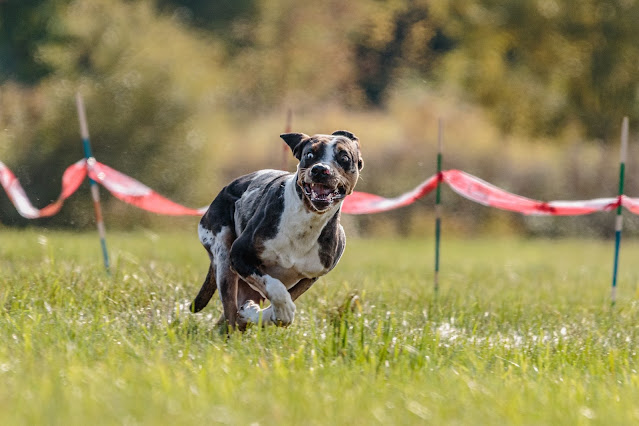Are you looking for ways to engage your furry friend and boost their cognitive abilities? Well, you're in luck because, in this article, we'll be discussing some tips and techniques on how to train your dog's brain.
✔🐶 Click Here: Get Dog Brain Training TipsAs a pet owner, it's important to prioritize the physical and mental health of your furry friend. While physical exercise is essential for a dog's overall well-being, mental stimulation is equally important. Training your dog's brain can not only prevent boredom but also reduce anxiety, destructive behavior, and depression in dogs.
Understanding the Importance of Mental Stimulation for Dogs
Dogs are naturally curious and intelligent animals. They require mental stimulation to remain happy and healthy. Mental stimulation provides a sense of purpose and fulfillment for dogs, just as it does for humans. Without it, dogs can become bored, anxious, and destructive. Mental stimulation also helps prevent cognitive decline in senior dogs.
Creating a Mental Stimulating Environment for Your Dog
One way to provide mental stimulation for your dog is to create an enriching environment. You can achieve this by providing your dog with a variety of toys, including puzzle toys that require problem-solving skills. You can also rotate your dog's toys to keep things interesting.
Incorporating Playtime into Your Dog's Routine
Playtime is an excellent way to engage your dog's mind. Games like hide-and-seek, fetch, and tug-of-war can help build problem-solving skills and improve your dog's physical fitness. You can also make playtime more challenging by adding obstacles, such as hurdles or tunnels.
Using Positive Reinforcement Techniques to Train Your Dog's Brain
Positive reinforcement techniques involve rewarding your dog for good behavior, such as sitting or staying on command. This type of training helps build a strong bond between you and your dog and encourages positive behavior.
Teaching Your Dog New Tricks and Commands
Teaching your dog new tricks and commands is an excellent way to challenge their brain. Simple commands, such as "sit" and "stay," can be built upon to teach more complex behaviors, such as shaking paws or playing dead.
Introducing Interactive Toys and Games to Your Dog
Interactive toys and games, such as treat-dispensing toys or scent-tracking games, are a great way to engage your dog's senses and problem-solving skills. These toys can also help reduce destructive behavior by keeping your dog occupied.
Providing Challenges for Your Dog
Providing challenges for your dog, such as hiding treats around the house or teaching them to find hidden objects, can help improve their problem-solving skills and mental agility.
Engaging Your Dog's Sense of Smell and Taste
Dogs have an incredible sense of smell, and you can use this to your advantage by providing them with different scents to sniff out. You can also incorporate different tastes into your dog's diet to keep them interested and engaged.
Exploring the Outdoors with Your Dog
Exploring the outdoors with your dog can provide a wealth of mental stimulation opportunities. Walking in new environments, such as parks or trails, can expose your dog to new sights, sounds, and smells. This can help improve their cognitive abilities and reduce boredom.
You can also make walks more challenging by incorporating obstacles or playing games, such as hide-and-seek. This not only engages your dog's mind but also provides physical exercise.
Encouraging Socialization and Interaction with Other Dogs
Socialization is an essential aspect of a dog's mental development. It teaches them how to interact with other dogs and humans and improves their overall behavior. Dog parks and group training classes are excellent opportunities for your dog to socialize and learn new skills.
Consistency is Key
Consistency is crucial when training your dog's brain. Set a routine and stick to it to reinforce good behavior and prevent confusion. Positive reinforcement techniques, such as treats or praise, should also be consistent to encourage desired behavior.
Rewarding Your Dog's Progress and Efforts
Rewarding your dog's progress and efforts is an essential part of their training. Positive reinforcement techniques, such as treats or praise, should be used to encourage desired behavior and motivate your dog to continue learning.
Understanding Your Dog's Limitations
While mental stimulation is essential for a dog's overall well-being, it's important to understand their limitations. Some dogs may not be able to perform certain tasks or may become overwhelmed by new environments. It's important to tailor mental stimulation activities to your dog's individual needs and abilities.
Conclusion
Training your dog's brain is an essential aspect of their overall health and well-being. By providing mental stimulation through various activities and techniques, you can improve their cognitive abilities, prevent boredom and destructive behavior, and strengthen your bond with your furry friend. Remember to tailor activities to your dog's individual needs and abilities and to reward their progress and efforts. By following these tips and techniques, you can help your dog lead a happy, healthy, and mentally stimulating life.
✔🐶 Click Here: Get Dog Brain Training Tips
FAQs
- What are some common signs that a dog is bored? A: Common signs of boredom in dogs include destructive behavior, excessive barking, and lethargy.
- How can I tell if my dog is enjoying mental stimulation activities? A: Dogs typically show signs of enjoyment during mental stimulation activities, such as wagging their tail, showing interest, and engaging in the activity.
- Can mental stimulation activities help reduce anxiety in dogs? A: Yes, mental stimulation activities can help reduce anxiety in dogs by providing a sense of purpose and fulfillment.
- Are there any mental stimulation activities that are not suitable for all dogs? A: Yes, some mental stimulation activities may not be suitable for all dogs, such as those with mobility or health issues. It's important to tailor activities to your dog's individual needs and abilities.
- Can mental stimulation activities be incorporated into a senior dog's routine? A: Yes, mental stimulation activities can be incorporated into a senior dog's routine to help prevent cognitive decline and improve overall well-being.















No comments:
Post a Comment